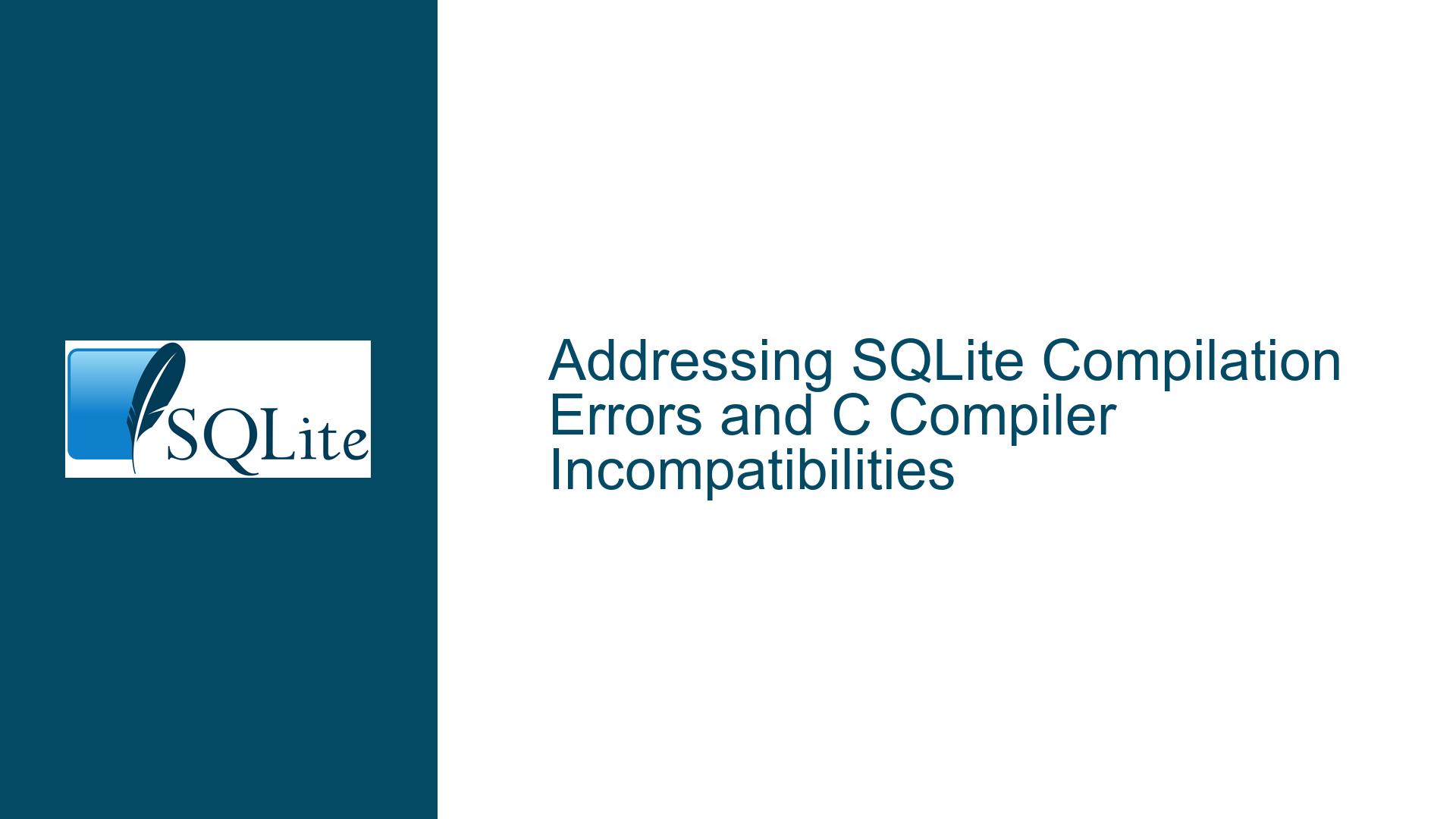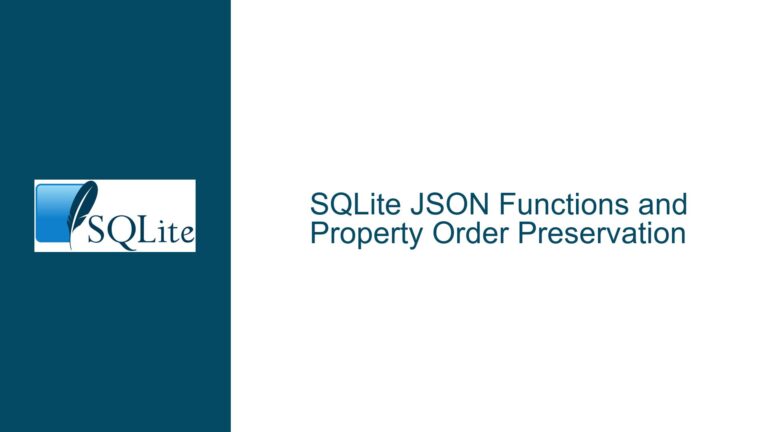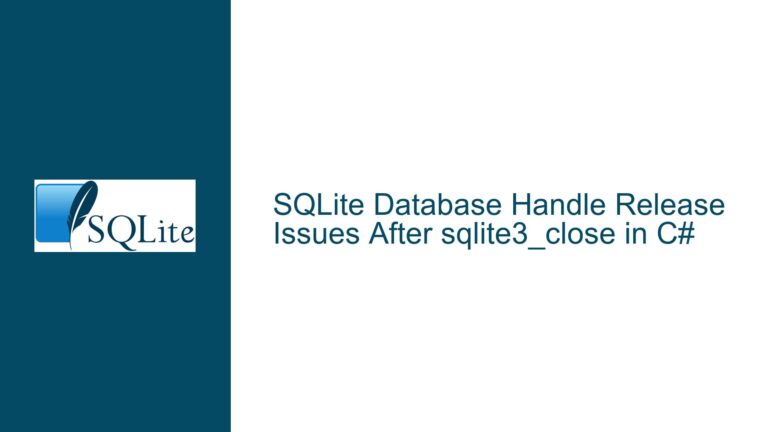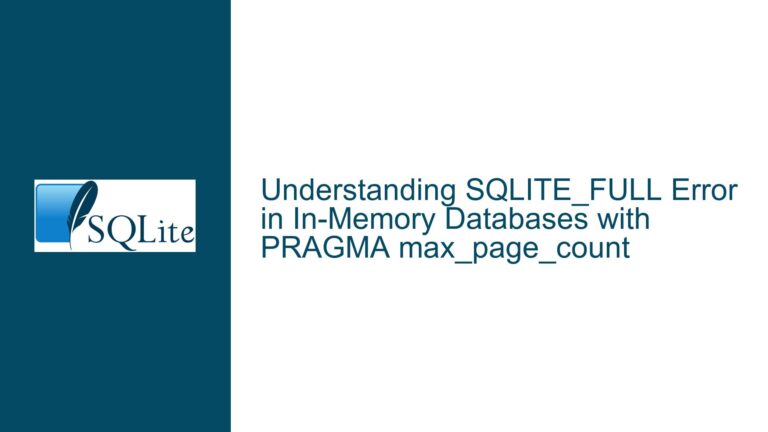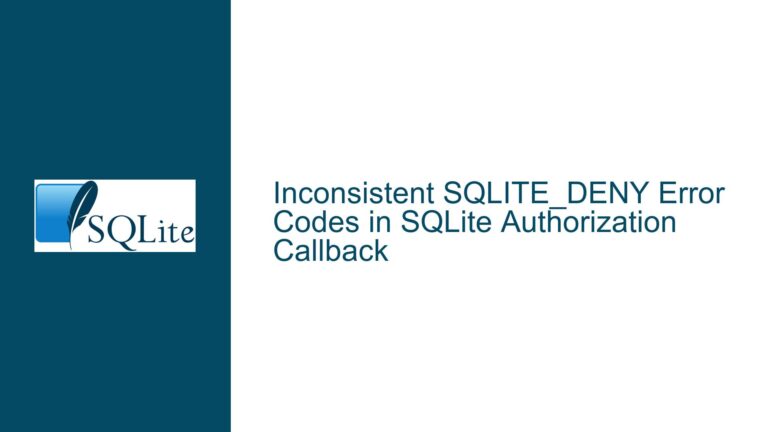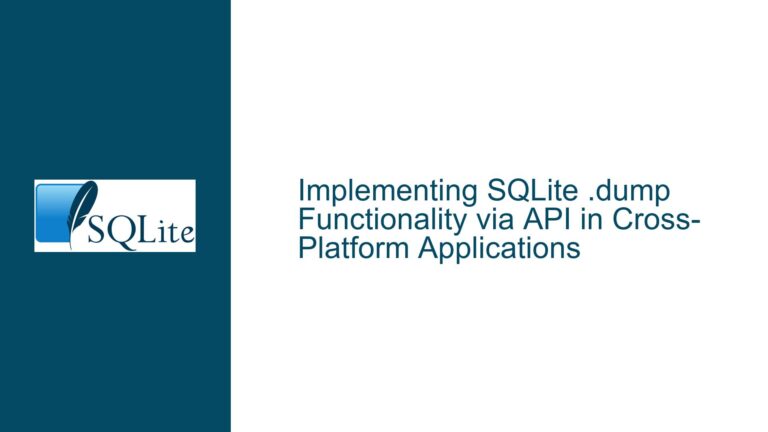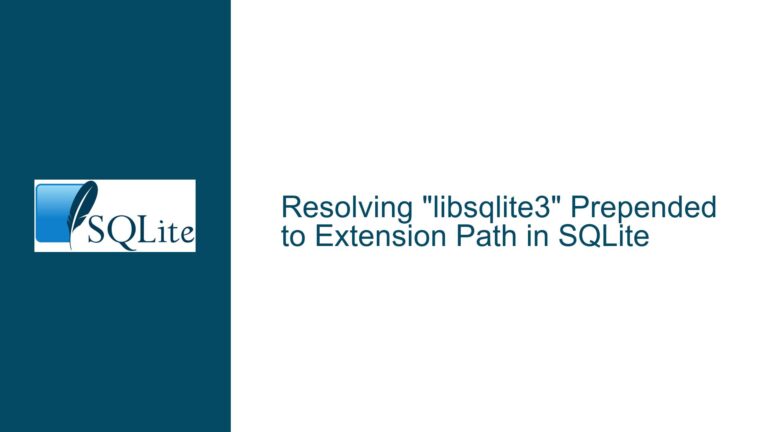Addressing SQLite Compilation Errors and C Compiler Incompatibilities
Understanding SQLite Compilation Challenges Across C Compiler Implementations
SQLite’s design as a self-contained, portable database engine relies heavily on adherence to the C programming language’s specifications. However, this dependency exposes SQLite to challenges arising from inconsistencies in how C compilers interpret language standards, particularly across historical and modern implementations. The core issue revolves around divergent compiler behaviors when processing code that leverages undefined or implementation-defined features of the C language. These discrepancies manifest as compilation warnings, errors, or static analysis failures, even when the SQLite source code strictly follows documented practices.
The problem is rooted in the ISO C standard’s deliberate allowance for "undefined behavior," which grants compilers freedom to handle specific code patterns in ways that align with their optimization strategies or target platforms. For example, pointer arithmetic assumptions that work flawlessly under one compiler might trigger segmentation faults under another due to differing memory alignment policies. SQLite’s codebase, while rigorously tested, occasionally employs low-level operations for performance or portability reasons, which can conflict with compiler-specific interpretations of the C standard.
Compilation errors often surface in environments where developers enforce strict adherence to static analysis tools or compiler flags that treat warnings as errors. Tools like Clang’s -Weverything or GCC’s -Wpedantic scrutinize code for constructs that technically comply with the C standard but rely on behaviors that are not universally guaranteed. For instance, SQLite’s use of type punning through unions, while valid in C99 and later, might trigger warnings in configurations targeting older C89/C90 standards or compilers that impose stricter aliasing rules.
Root Causes of Compiler-Specific Warnings and Static Analysis Failures
The primary causes of SQLite compilation issues stem from three interrelated factors: the evolution of the C language standard, compiler-specific extensions and optimizations, and the inherent tension between performance optimizations and strict standards compliance.
First, the historical fragmentation of the C standard has led to ambiguities in how compilers handle edge cases. The ISO C89, C99, C11, and C17 standards introduced incremental changes, but compiler support for these revisions varies widely. SQLite’s commitment to backward compatibility means it must accommodate compilers that adhere to older standards, necessitating workarounds for features absent in those versions. For example, SQLite’s use of stdint.h for fixed-width integer types is problematic in environments where this header is missing or incomplete, requiring manual typedefs that may conflict with compiler-specific headers.
Second, compiler optimizations aggressively exploit undefined behavior to generate faster or smaller code. A classic example is the elimination of code paths deemed unreachable due to undefined operations. Suppose SQLite contains a function that performs a memory copy using pointer arithmetic that a compiler determines could overflow. In such cases, the optimizer might remove error-checking logic downstream, assuming the overflow cannot occur. This behavior, while legal under the C standard, introduces runtime vulnerabilities that contradict SQLite’s safety guarantees.
Third, static analysis tools often enforce stricter interpretations of the C standard than compilers. Tools like Coverity or Clang’s Static Analyzer flag code patterns that, while technically compliant, pose risks under certain compiler configurations. For instance, SQLite’s custom memory allocator uses pointer tagging to distinguish between aligned and unaligned blocks. Such patterns may trigger false positives in analyzers that lack context about the allocator’s internal invariants, leading to spurious warnings about invalid pointer casts.
Resolving Compilation Errors and Enhancing SQLite Code Portability
To mitigate compilation issues, developers must adopt strategies that reconcile SQLite’s design goals with the realities of heterogeneous compiler ecosystems. The following approaches address common pitfalls while preserving SQLite’s performance and portability.
Leverage SQLite’s Compiler-Specific Adaptations: SQLite includes platform-specific code blocks guarded by preprocessor directives like #ifdef __GNUC__ or #ifdef _MSC_VER. When encountering compiler warnings, review these sections to ensure the correct branches are activated. For instance, SQLite uses __attribute__((aligned)) under GCC to enforce structure alignment but relies on __declspec(align) for MSVC. Misconfigured build systems may fail to detect the compiler correctly, leading to incorrect alignment directives and subsequent crashes.
Adjust Compiler Flags for Targeted Standards Compliance: Explicitly specify the C standard version during compilation using flags like -std=c11 or -std=gnu99. This prevents compilers from defaulting to older standards that conflict with SQLite’s assumptions. However, avoid overly restrictive flags like -Wconversion or -Wstrict-prototypes unless necessary, as they may flag benign SQLite code. For projects enforcing strict static analysis, selectively disable warnings using pragmas or command-line options. For example, wrap SQLite’s amalgamation include with:
#pragma GCC diagnostic ignored "-Wunused-function"
#include "sqlite3.c"
#pragma GCC diagnostic pop
Modify Code to Eliminate Undefined Behavior Hotspots: Identify code segments flagged by multiple compilers or analyzers and refactor them to use well-defined constructs. For instance, replace pointer arithmetic with array indexing where feasible, or use memcpy for type punning instead of union-based aliasing. SQLite’s sqlite3_malloc implementation already avoids reliance on platform-specific allocation alignment guarantees by over-allocating and adjusting pointers. Extend this principle to other areas, such as replacing bitwise operations on signed integers with unsigned equivalents to sidestep undefined signed overflow behavior.
Utilize SQLite’s Amalgamation Build: The amalgamation (a single sqlite3.c file) includes platform-specific optimizations and workarounds pre-vetted by the SQLite team. This minimizes the risk of compiler mismatches compared to building from individual source files. Ensure the amalgamation is regenerated from the latest source when targeting new architectures, as version-specific fixes for compiler bugs are frequently added.
Engage with the SQLite Community for Edge Cases: When facing persistent, obscure compilation failures, consult SQLite’s mailing list or forum. Many compiler-specific quirks, such as MSVC’s handling of variable-length arrays or ICC’s loop optimization heuristics, have been documented and resolved through community input. Provide detailed context, including the compiler version, target platform, and exact error messages, to expedite troubleshooting.
By systematically addressing compiler discrepancies through targeted code adjustments, build configuration tweaks, and community collaboration, developers can maintain SQLite’s robustness across diverse C toolchains while leveraging modern static analysis tools to enhance code quality.
